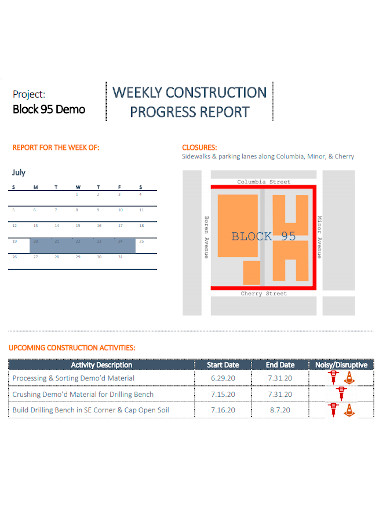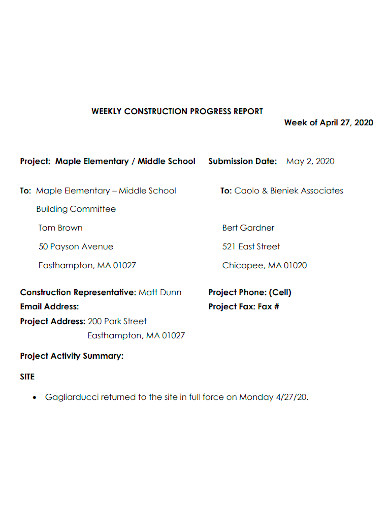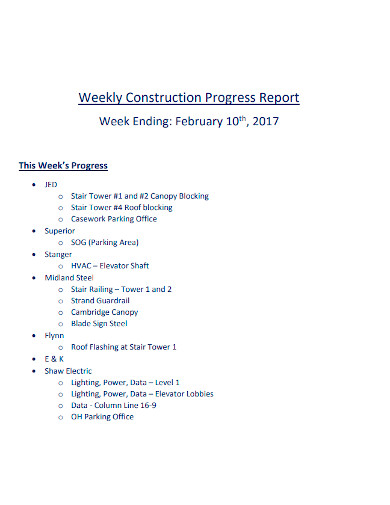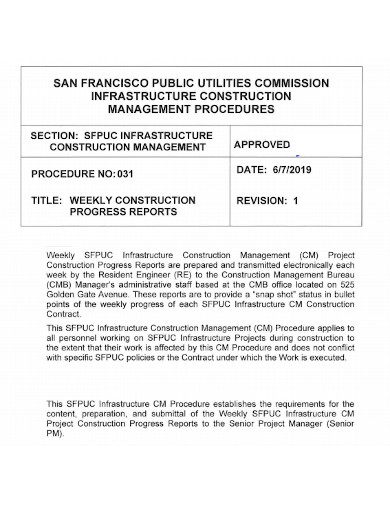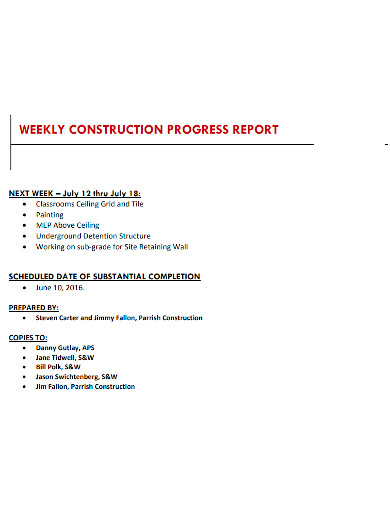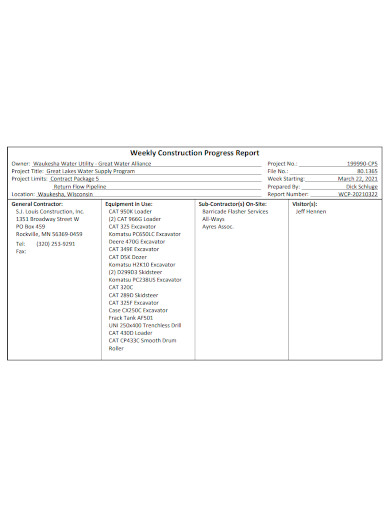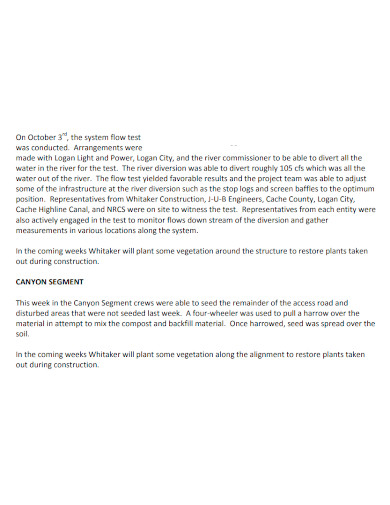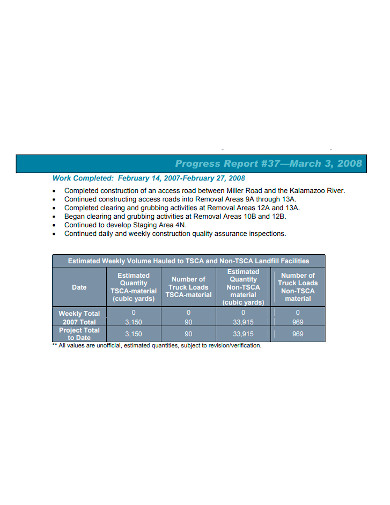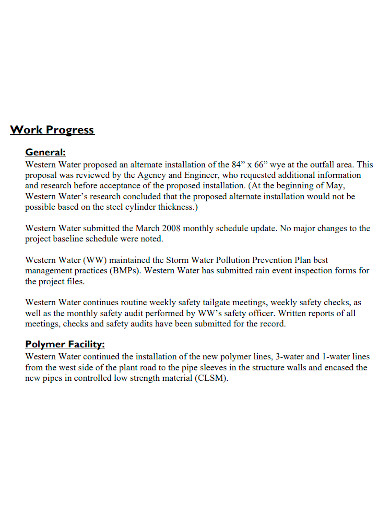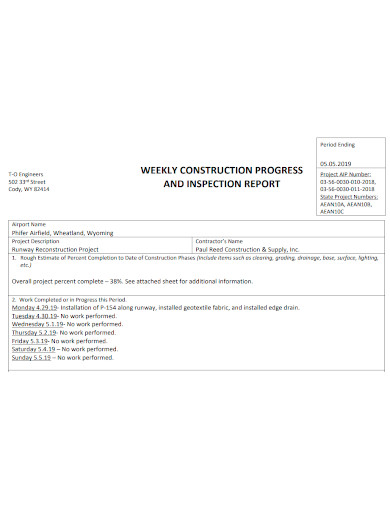A couple of days into a project, the project supervisor or project developer suddenly asks their employees to submit a progress report. Progress reports are documents that keep track of the project’s progress as it continues development. Most of the time, its in a format of a short series of working days, usually a week to a month. Employers request progress reports to provide themselves a summary of what has been achieved and overall progress of the team in an established span of time. This ensures that the employees will have the opportunity to review their work and how they have contributed to the project, and to the entire team. And on the other hand, employers are able to keep track of the employee’s performance in the worksite and in turn could effectively delegate certain tasks at hand
Since progress reports are essentially just an overview of an employee’s workweek. The shape, size, and scale of the project doesn’t really matter. If you’re a project developer and you want to keep track of your team’s and the project’s progress, then writing a progress report is the right step to take. Projects such as construction work really well with a progress report because, of course you’d want to know the current status of whatever you are building, whether you’re making significant progress or not. Depending on your experience with writing documents, you might be confused, anxious, or maybe even ready, when your employer asked for a weekly construction progress report. But don’t fret, because we’re here to help. First off, check out these weekly construction progress report samples listed below just to help you get to know the document. See what a well-written report looks like. You can even use these as a guide, or a template, when you’re finally starting to make your own.
9+ Weekly Construction Progress Report Samples
1. Weekly Construction Progress Report Sample
2. Weekly School Construction Progress Report
3. Standard Weekly Construction Progress Report
4. General Weekly Construction Progress Report
5. Formal Weekly Construction Progress Report
6. Editable Weekly Construction Progress Report
7. Professional Weekly Construction Progress Report
8. Weekly Construction Progress Report Format
9. Weekly Construction Work Progress Report
10. Weekly Construction Progress and Inspection Report
What Is a Weekly Construction Progress Report?
A weekly progress report serves as a communication and coordination document between different departments of the project or between the team and the project developers. The document is also used to evaluate and keep track the team’s performance and progress, as it keeps the management informed on their achievements and accomplishments. The management is able to develop worksite strategies and ensures that the output of every task is up to their satisfactions. Basically, it contains a quick recap of whatever happened in the construction site in a span of a workweek. Another thing that’s beneficial about writing a progress report is that you as an employer can review the tasks that you have done and can gauge which aspect can improve and what task you can work on best. On the other hand, employers can get an idea of the overall quality of your work, how your efforts contribute to the tasks at hand, gives them a better sense of the pacing of the project, and how the team can continuously improve upon it.
How to Write a Weekly Construction Progress Report
Weekly reports are an essential document in the workplace. We’ve already covered why it is important so I suppose you already know why there is a drastic need to draft it properly. Make sure its comprehensible and easy to understand. It can be relatively difficult to write for the first time, but breaking it down to 5 simple components should make it a whole lot easier.
- Establish the purpose
It is vital to figure out the objectives of the progress report before actually writing it. Aside from letting your supervisor know what has happened in the past week, what other pieces of information are they looking for? What does your supervisor want to see in your report? It’s usually just the same things every week, unless your management says otherwise. The structure of a weekly progress report usually cover the progress of the task at hand, it’s current completion statues, challenges you or the team has encountered and how you worked around it, your weekly timeline, schedules, deliverables, and a rough plan for next week. - Know your role
One more thing to keep in mind is that you have to perfectly know about your role. You have a proper and complete grasp of what the definition for success is for the project or for the task that you are working on. - Layout
A progress report is more than just slapping a paragraph or two about your week in the construction site. In fact, that’s not it at all. A proper report follows a pretty organized layout, short, concise, and visually appealing. There should be some sort of presentation to it, not just a piece of paper. This will ensure that your report is presentable and informative whilst remaining professional. Like you really tried to write it properly. The templates and samples provided above should be more than enough to get you started, but feel free to look for more layout samples online. - Characteristics
Weekly reports should really, as in, really be short and concise. It should be brief and straight to the point, presented clearly in as few words as possible. But not to the point of vagueness. There’s a fine line between overcompensation and just straight up vague, and the report should rest on that fine line. Don’t use too many work jargons, in fact, just use a simple language. Employers really appreciate it when the presentation is crystal clear and the results are presented openly. - Five more details to keep in mind
- Summarize
- Proper dates and dating format
- Deliverables
- Titles
- Tasks and task progress report
- Weekly results and achievements
- Challenges encountered
- Plans for next week and the future of the project
FAQs
What is a monthly report?
A monthly report is a summary of all the work and work related activities that have occurred during the given month. Like a weekly report, it informs the employer about the progress of that project and overall productivity.
What is a formal report?
Formal reports are official reports that contain several data and research information needed to make informed business decisions.
What is a daily report in construction?
A construction daily report is a record of notes, including work completed, weather conditions, materials delivered onsite and materials used.
Weekly progress reports, or just any progress report in general, does have a lot of weight in it. Most employers depend on that document to have a proper idea of what has been going on in the worksite, and if done poorly, could lead to miscommunication, or worse, losing track of the project itself. So be sure to keep in mind the tips we have given you and feel free to use the templates as well, to come up with a near perfect weekly construction progress report.
Related Posts
FREE 11+ Weekly Construction Report Samples
FREE 10+ Construction Progress Report Samples
FREE 9+ Project Progress Report Samples
FREE 25+ Sample Weekly Report Templates
FREE 16+ Weekly Report Samples
FREE 16+ Sample Weekly Status Report Templates
FREE 15+ Weekly Report Samples
FREE 15+ Sample Progress Report Templates
FREE 13+ Construction Inspection Report Samples
FREE 10+ Sample Job Progress Reports
FREE 7+ Construction Field Report Samples
FREE 39+ Sample Reports
FREE 36+ Report Templates
FREE 22+ Sample Construction Reports
FREE 18+ Weekly Report Templates

